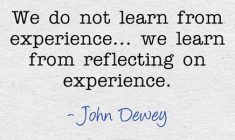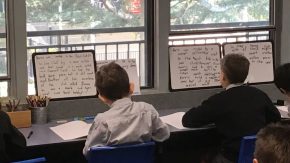PYP
Making learning meaningful
There are 3 words that have a significant impact on learning – reflecting, feedback and feedforward – which usually occurs when we are nearing the end of learning, however, our focus for making learning meaningful is to use these words as many times as we can while we are learning and not keep it until the end. It is usually at the end of the year that most reflection is carried out by students, teachers and parents.
Being Reflective is one of the ten learner profiles of the PYP which encourages us to “thoughtfully consider the world and our own ideas and experiences. We work to understand our strengths and weaknesses in order to support our learning and personal development.” (IBO Learner Profile) To be reflective means to mentally wander through where we have been and to try to make some sense of what we have experienced. Most classrooms are oriented more to the present and the future than to the past and this means that students (and teachers) find it easier to discard what has happened and to move on without taking stock of the experiences of the past.
Reflection has many facets. For example, reflecting on work enhances its meaning. Reflecting on experiences encourages insight and complex learning. We foster our own growth when we control our learning, so some reflection is best done alone. Reflection is also enhanced, however, when we ponder our learning with others. It involves linking a current experience to previous learnings. To reflect, we must act upon and process the information, synthesizing and evaluating our experiences. In the end, reflecting also means applying what we’ve learned to contexts beyond the original situations in which we learned something.
Reflective learning is a way of allowing students to step back from their learning experience to help them develop critical thinking skills and improve on future performance by analysing their experience. This type of learning, which helps move students from surface to deep learning, can include a range of activities, including self-review and peer review.
As teachers, we pretty much give feedback all day long. We tell students how they can improve with their learning, we praise them for things they’re doing well and we amend their incorrect responses and we encourage our students to give feedback to each other. The experience of school could be described as one long feedback session, where every day, people show up with the goal of improving.
When we feedforward, instead of rating and judging a person’s performance in the past, we focus on their development in the future. Suppose a student is writing a story. Instead of waiting until he is finished, then identifying all the errors, we would read parts of the writing while he is writing it, point out things that are noticeable, and ask questions to get the student thinking about how he might improve the writing.
The most effective kind of feedforward helps people see opportunities for growth—ways they could take on new opportunities and roles.
Effective feedback starts with what is and helps add to it, expanding what’s possible, rather than simply pointing out problems. So rather than wait until a task or activity is done to point out all the ways a student can improve, we strive to find ways to give them specific pointers while they work, and only one thing at a time, so that they can process and act on it right away.
“Getting positive feedback about our performance may feel good, but it doesn’t break new ground. It merely confirms what we already know about ourselves and our talents, essentially holding our growth in check. But when feedback gets us thinking about how to spread that talent to others, it has a multiplying effect.” (Joe Hirsch)
Sue Gough – PYP Coordinator







